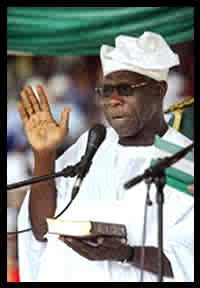"Very bleak" in 1999, what do we say in 2013, how clearer or even bleaker has it become? (The answer rings in all our minds).
Obasanjo stated openly that he was not a "Miracle Worker" ...NIGERIA NEEDS A MIRACLE TO BE FIXED isn't it?
With the 2015 General (S)elections around the corner, in what is expected to usher Nigeria into another republic, a spate of confusion in the polity, power play, political witch-hunting amongst other things are the recent characteristic features of the Nigerian scene. Every action and political decisions seem to be bearing the 2015 regime in mind and sight. All I wish to do without much digression, is bring to light again the inauguration of the fourth republic and the birth of May 29, the reason for which you and I are having a holiday today. And that I'll go straight to doing.
The Fourth Republic is the republican government of Nigeria. Since 1999 it has governed the country according to the fourth republican constitution. It was in many ways a revival of the Second Republic, which was in place between 1979 and 1983 and suffers many of the same problems, such as multiple ministries which made policy planning difficult. Nigeria adopted the constitution of the Fourth Republic on May 29, 1999.
Founding (1999)
Following the death of military dictator and de facto ruler of Nigeria, General Sani Abacha in 1998, his successor General Abdusalami Abubakar initiated the transition which heralded Nigeria's return to democratic rule in 1999. The ban on political activities was lifted, and political prisoners were released from detention facilities. The constitution was styled after the ill fated Second Republic — which saw the Westminster system of government jettisoned for an American Presidential system. Political parties were formed (People's Democratic Party (PDP), All Nigeria Peoples Party (ANPP), and Alliance for Democracy (AD)), and elections were set for April 1999. In the widely monitored 1999 election, former military ruler Olusegun Obasanjo was elected on the PDP platform. On 29 May 1999, Obasanjo was sworn in as President and Commander-in-Chief of the Federal Republic of Nigeria.
In the controversial general election on 21 April 2007, Umaru Yar'Adua of the PDP was elected President.
Following the death of Umaru Yar'Adua on 5 May, 2010, Goodluck Jonathan became the third president(Interim) and later won the election the following year which was largely accredited as freer and fairer than all the previous elections of the 4th Republic.
Presidents
Presidents during the Nigerian Fourth Republic
PresidentTermParty
Olusegun Obasanjo29 May 1999 – 29 May 2007PDP
Umaru Yar'Adua29 May 2007 – 5 May 2010PDP
Goodluck Jonathan6 May 2010 – IncumbentPDP
Political parties
Action Congress (AC)
Alliance for Democracy (AD)
All Nigeria Peoples Party (ANPP)
All People's Party (APP)
All Progressives Grand Alliance (APGA)
Congress for Progressive Change (CPC)
Democratic People's Alliance (DPA)
National Democratic Party (NDP)
New Democrats (ND)
People's Democratic Party (PDP)
Progressive Peoples Alliance (PPA)
People's Redemption Party (PRP)
People's Salvation Party (PSP)
United Nigeria People's Party (UNPP)
Fresh Democratic Party (FDP)
Conscience Party of Nigeria (CPN)
Justice Party (JP)
Masses Movement of Nigeria (MMN)
Constitutional amendments
Third-term Agenda.
The Wordsmith™
(2013).
References
The History of Nigeria
Media Accountability and Democracy in Nigeria.


